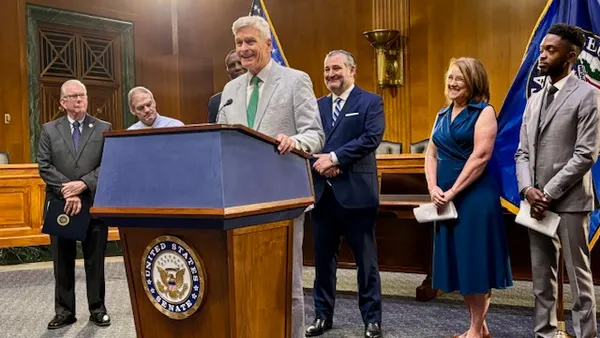Dive Brief:
-
Charter schools will have a harder time expanding compared to previous administrations under final rules published by the U.S. Department of Education Wednesday. But the final rules are still less restrictive on charter schools than the requirements the Biden administration originally proposed in March.
-
Charter schools seeking grant funding will not have to provide a community impact analysis as originally proposed. Instead, charters have to demonstrate "sufficient demand for the charter school" under a new need analysis, which will assess the viability of and need for a charter in a community. Charters can show a need even if their district has declining enrollment, the new rules clarify, which will give charters more leeway when compared to the proposals.
-
The rules also make clear that a proposed charter would not be at a disadvantage if it cannot show it is racially or socioeconomically diverse because of its mission, or because the community itself is racially or socioeconomically segregated — such as a charter school that would enroll 90% Native American students.
Dive Insight:
The proposed charter school rules received 26,553 comments since their publication in March. While those proposals got pushback from charter school advocates, many now agree the final rules are less stringent.
"The first thing to note is that these final regulations are much less bad than the proposed ones were," said Mike Petrilli, president of the Fordham Institute, a conservative think tank, in an email. He said the charter movement helped ease some of the earlier proposals that would have been more restrictive for charters.
For example, the National Alliance for Public Charter Schools expressed concern that applicants would have to submit their targeted student and staff demographics and also how they planned to maintain socioeconomically diverse student and staff populations.
Now, the alliance said in a statement the final rules "are indeed less harmful than the original proposal."
"It is clear our collective voices were heard and some of the most troubling aspects of the proposed rules that relate to community impact analysis, diverse charter schools, and the burdensome nature of the application process itself are improved," said Nina Rees, alliance president and CEO, in a statement.
The rules do maintain, however, that applicants must demonstrate a need and viability for charters. In its explanation, the Department of Education said about 930 charter schools — or 14.5% of schools funded by Charter School Programs, the federal program that provides funds for charters — either never opened or had closed prior to the end of their grant period.
"These charter school closures and failures to open cost more than $174 million in Federal resources provided through CSP; are disruptive for communities, particularly for students and families directly affected by school closures; and potentially undermine the effectiveness of charter schools," the department said. Those who are more skeptical of charters also support their greater oversight.
Petrilli added that, despite the rules being less harmful than the original proposals, "these regulations still aren't great."
"The biggest practical problem is how little time the Biden Administration is providing for this year's grant competitions," Petrilli said. There is a 30-day window for CSP applicants, a much shorter timeline than advocates would have liked.
"Combined with the onerous new rules, with many additional requirements for analyses and explanations and data, it's going to cost a fortune for schools and other entities to put together strong proposals on this tight timeline," Petrilli said, "which is going to benefit the big networks with large pockets and hurt the small guys — the schools that tend to be run by community-based organizations and people of color."
The rules will also make it difficult for for-profit management companies to receive funds, which is in line with President Biden's plan since before he entered the Oval Office. During his campaign, Biden took a hard stance against for-profit charters and other measures that use public funding for non-public options.
"Some of the management chains are quite good, and these rules will make it harder for them to start schools," said Petrilli. "Given that competition from charter schools clearly helps students in traditional public schools, too, this is a double whammy — hurting the kids who might have been served by such schools, as well as their peers in districts."
Jeanne Allen, the founder and CEO of the Center for Education Reform, a pro-charter organization, said she expects future administrations to overturn the regulations.
Freedom for charters, which she said is hindered by the new requirements, "is the hallmark of charter school accountability and why they are so successful."
"Without completely reversing their rules, there is no improvement," Allen said.













